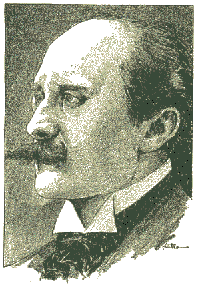 WHEREVER a translation of the famous Cyrano de Bergerac exists, the lasting fame of the French poet-dramatist Edmond Rostand is assured. In fact, all three of his best known plays ... Cyrano, L'Aiglon, and Le Chanticler ... stand alone in the roster of romantic plays. The gorgeous rhythm of the poetry, for example, in Cyrano; the sheer audacity of a most unusual hero; and, finally, the beauty of the sentiment place this play in a class by itself with the best of Sophocles, Shakespeare or Molière.
WHEREVER a translation of the famous Cyrano de Bergerac exists, the lasting fame of the French poet-dramatist Edmond Rostand is assured. In fact, all three of his best known plays ... Cyrano, L'Aiglon, and Le Chanticler ... stand alone in the roster of romantic plays. The gorgeous rhythm of the poetry, for example, in Cyrano; the sheer audacity of a most unusual hero; and, finally, the beauty of the sentiment place this play in a class by itself with the best of Sophocles, Shakespeare or Molière.
Rostand's father was a brilliant and wealthy journalist. Young Rostand was educated in Paris and, like so many men of his day and class, studied law and received his degree. His mind, however, had been set from boyhood for writing plays.
In 1890, when Rostand was only 22, he published a volume of poems, his first work of any note. In 1894 his first important play, The Romancers, was produced at the Comédie Française. If proof were needed that his contemporaries considered him a successful playwright, the fact that the great Bernhardt played the following year in his The Faraway Princess, and again in 1897 in The Woman of Samaria would be sufficient.
The greatest rôle in any of Rostand's plays, Cyrano, was planned and written especially for the great French actor, Constant Coquelin. It was at the actor's request, in fact, that the final death scene was planned. All of Rostand's best works, it seems, are tragedies, yet they leave the audience with a feeling of happiness and inspiration that many a comedy fails of producing. As one critic has it: "Death in Rostand is more cheerful than life in Maeterlinck."
When, in 1901, following the success of L'Aiglon, Rostand was elected to the French Academy, he was the youngest member ever to be chosen for that honor. The hold that Rostand secured on a far-flung audience cannot be better illustrated than by an incident that occurred on the occasion of the first performance of Chanticler in Paris. On the following day, "a daily newspaper in Butte, Montana, devoted, not the first column, but the entire first page to Chanticler!"
Rostand was prevented from living in Paris by his delicate health which required a kinder climate. Incidentally, he could not take a walk on Paris streets without being followed by adoring crowds. He built himself a huge château at Cambo in the Pyrenees where he lived and wrote until his death in 1918. His wife, too, was a poet, who doubtless would have been famous had not her husband's star so far eclipsed her own.
Purchase Books by Edmond Rostand